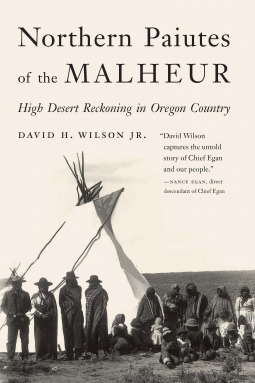
Northern Paiutes of the Malheur
High Desert Reckoning in Oregon Country
by David H. Wilson
This title was previously available on NetGalley and is now archived.
Send NetGalley books directly to your Kindle or Kindle app
1
To read on a Kindle or Kindle app, please add kindle@netgalley.com as an approved email address to receive files in your Amazon account. Click here for step-by-step instructions.
2
Also find your Kindle email address within your Amazon account, and enter it here.
Pub Date May 01 2022 | Archive Date Apr 30 2022
University of Nebraska Press | Bison Books
Talking about this book? Use #NorthernPaiutesoftheMalheur #NetGalley. More hashtag tips!
Description
In 1870 a twenty-six-year-old Paiute, Sarah Winnemucca, wrote to an army officer requesting that Paiutes be given a chance to settle and farm their ancestral land in Oregon Country. The eloquence of her letter was such that it made its way into Harper’s Weekly. Ten years later, as her people languished in confinement as a result of the Bannock War, she convinced Secretary of the Interior Carl Schurz to grant the requests in her letter and to free the Paiutes as well. Schurz’s decision unleashed a furious campaign of disinformation by the Bureau of Indian Affairs, cattlemen, and settlers, overturning Schurz’s decision, sweeping truth aside, and falsely branding Paiute chief Egan as instigator of the war.
To this day histories of the Paiutes appear to be unanimous in their mistaken claim that Egan led his Paiutes into the Bannock War. Indian agents’ betrayal of the people they were paid to protect saddled Paiutes with responsibility for a war that most opposed and that led to U.S. misappropriation of their land, their only source of life’s necessities. With neither land nor reservation, Paiutes were driven more deeply into poverty and disease than any other Natives of that era. In Northern Paiutes of the Malheur David H. Wilson Jr. pulls back the curtain to reveal what government officials hid—exposing the full jarring injustice and, after 140 years, recounting the Paiutes’ true and proud history for the first time.
Advance Praise
“In Northern Paiutes of the Malheur David Wilson captures the untold story of Chief Egan and our people, fulfilling the wish of my grandfather Hubert Egan for the true story of the Paiutes, hidden for almost a century and a half, to be revealed at last.”—Nancy Egan, direct descendant of Chief Egan and representative of the Egan family
“Wrong was done to the Paiutes—it’s as simple as that—and the passion David Wilson puts into telling their story comes through more powerfully for the restrained and careful way he tells it. This will be a book of lasting value for its contributions to the history of the West and for its simple, elegant prose, which is a western artifact of its own. Both authoritative and exciting to read, this is an excellent piece of work.”—Ian Frazier, best-selling author of Great Plains and On the Rez and two-time winner of the Thurber Prize
“Fascinating. . . . Extensively researched and carefully documented, Northern Paiutes of the Malheur is essential reading for anyone interested in Native American history of the Northwest.”—Steven Lubet, author of The “Colored Hero” of Harper’s Ferry: John Anthony Copeland and the War against Slavery
“Northern Paiutes of the Malheur fills a historical gap with a meticulously researched, fascinating story of the survival of a small band of Indians who wanted to go home—and eventually did. . . . David H. Wilson Jr. does extremely well in describing personalities and backgrounds of leading characters in the story, bringing them to life as real people, not dull figures from a history book. He also excels at placing events in context of some of the cultural and social movements that affected Indian policy.”—Roberta Ulrich, author of American Indian Nations from Termination to Restoration, 1953–2006
Available Editions
| EDITION | Other Format |
| ISBN | 9781496230454 |
| PRICE | $34.95 (USD) |
| PAGES | 336 |
Featured Reviews
 Casey W, Reviewer
Casey W, Reviewer
This book tells the story of the Paiutes in Oregon and their struggles to maintain their lifestyle from encroaching settlers. They were a challenge for the government to deal with due to their small bands of family related villages that were widely scattered and hard to age to. It covers their plight from the early 1800s to the 1930s. I highly recommend this book for anyone with an interest in western history.
I received a free Kindle copy of this book courtesy of Net Galley and the publisher with the understanding that I would post a review on Net Galley, Goodreads, Amazon, Facebook and my nonfiction book review blog.
Northern Paiutes of the Malheur, by David H. Wilson, Jr., is a book that reveals a true story that is well researched and documented historically. Some readers may be affected by these triggers: vivid descriptions of detailed scalpings and wounds, and the inhumane handling and desecration of Native American skulls and Black skulls. Moreover, there were several main characters in sharp detail throughout the historical novel, maps, and many photos to paint a more thorough visual to add to the story. Some major characters are Nancy Egan: spokesperson for the Egan family. Chief Egan: a Chayuse who became a Paiute Chief in 1873. Chief Weyouwewa-head Paiute Chief until death in 1873. Chief Winnemucca- Nevada Chief who came to Malheur Reservation in Oregon in 1875 with daughter Sarah Winnemucca. Also, many officials of the Interior Department and military personnel.
In the beginning, the Paiutes were strong, proud, independent people who lived off their land. Consequently, the Paiutes lost more land and vegetation, and independence as time passed. In 1850, the Donations Claims Act accelerated a different kind of immigrant. They claimed all of the fertile lands from the Paiutes. Finally, in the fall of 1873, Paiutes moved onto Malheur Reservation. Chief Egan wanted peace, but the Indian agent, William Rhinehart, for Malheur Reservation twisted the truth regarding Chief Egan in his reports. The U. S. government did not fulfill several treaties, Native tribes fought wars, and they were starving, misplaced, ill, and dying. They ended up with smaller reservations when they were used to being free on their land.
This book had a great impact on me because it is a true historical account of the Paiutes story of independence and struggles and finding their way again. The maps and photos are a priceless addition to history we can view to look back at history.
I recommend this book to everyone, especially if you desire an in-depth look at the history of Native America.
Readers who liked this book also liked:
John Kotter; Holger Rathgeber
Business, Leadership, Finance, Nonfiction (Adult)













